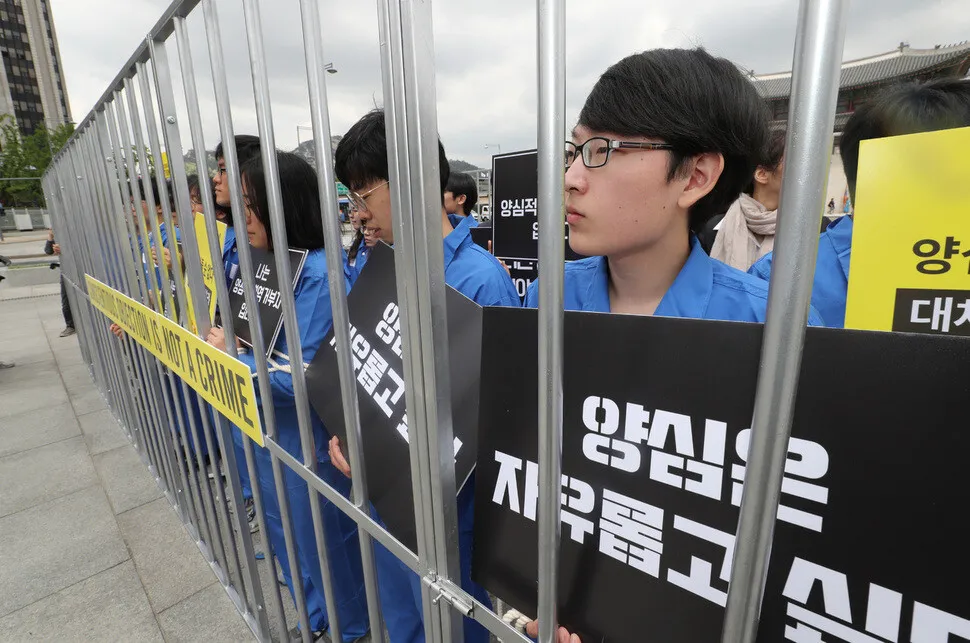hankyoreh
Links to other country sites 다른 나라 사이트 링크
National humans rights commission investigates legality of preventing conscientious objectors from working

The National Human Rights Commission of Korea (NHRCK, chairperson Lee Sung-ho) launched an investigation into the abuse of legal provisions barring employment and business activity by people on trial for refusing conscription. It is the first measure taken by a government agency since reports that the Military Manpower Association (MMA) cited the Military Service Act in issuing a measure demanding that a 21-year-old surnamed Park – who is currently on trial for refusing mandatory military service on religious grounds – close down his chicken restaurant.
According to an investigation by the Hankyoreh on May 4, the NHRCK requested on May 2 that the MMA look into the workplace closure measure, which was based on Article 76 of the Military Service Act. The provision in question bars the state, local governments and employers from appointing or employing people avoiding conscription or mobilization, and requires the cancellation of associated permits, approvals, licenses and registrations.
Park received notice of the chicken restaurant closure measure on Apr. 17 after being classified as a “military service evader,” but dodged an immediate workplace shutdown after a court decision suspending its execution.
Regarding the reasons for the investigation, an NHRCK senior official said, “It was determined to be in violation of the principle of presumed innocence to apply the provision in question even in cases where someone is awaiting a final judicial decision over refusal to perform military service.”
“The provision in question also poses a risk of abuse for military service objectors in general, as it does not include exceptions from administrative action for refusal of conscription on ‘legitimate grounds,’” the official added.
The NHRCK plans to examine specific follow-up actions based on the data it has assembled. It may invoke its authority to investigate if the human rights violation is deemed to be severe, and it may issue a commission-level opinion or chairperson’s statement based on assembled cases. In Park’s case, the commission has said it plans to closely monitor future developments to prevent abuses from increasing.
Park, who has already filed an administrative suit against the MMA asking for the restaurant’s closure to be reversed, also plans to submit a request for the court to recommend a constitutionality hearing on the corresponding Military Service Act provision.
The NHRCK previously issued two recommendations in 2004 and 2016 for the Ministry of National Defense to amend the provision, but the ministry rejected the recommendation, citing the potential for abuse. After the May 2 report, the MMA issued an official statement – which it immediately retracted – warning that “cases of abuse will increase if no punitive measures are taken because a trial is under way.”
“Initially, there were concerns that [the report] could influence military service evaders, but we ended up retracting the statement after determining it was different from what the report was saying,” an MMA official said.
By Hyun So-eun, staff reporter
Please direct comments or questions to [english@hani.co.kr]

Editorial・opinion
![[Editorial] Korea must prioritize national interest in response to talk of USFK reductions [Editorial] Korea must prioritize national interest in response to talk of USFK reductions](https://flexible.img.hani.co.kr/flexible/normal/500/300/imgdb/original/2025/0811/7417549025880585.jpg) [Editorial] Korea must prioritize national interest in response to talk of USFK reductions
[Editorial] Korea must prioritize national interest in response to talk of USFK reductions![[Editorial] Presidential office administrator called on far right to shield Yoon from arrest [Editorial] Presidential office administrator called on far right to shield Yoon from arrest](https://flexible.img.hani.co.kr/flexible/normal/500/300/imgdb/original/2025/0811/8817549005592931.jpg) [Editorial] Presidential office administrator called on far right to shield Yoon from arrest
[Editorial] Presidential office administrator called on far right to shield Yoon from arrest- [Editorial] The ex-first lady and president doth protest too much
- [Correspondent’s column] Gerrymandering and the state of America to come
- [Editorial] Bolder measures needed to bring Pyongyang to dialogue table
- [Editorial] Anti-corruption official’s death must not be in vain
- [Editorial] The end of Kim Keon-hee’s untouchability
- [Editorial] Essential preparation for new chapter of ROK-US alliance
- [Column] After tariff typhoon, is a security storm in store for Korea next?
- [Editorial] We’ve seen enough of Yoon’s shameless behavior
Most viewed articles
- 1Yoon and Kim could make history as first ex-presidential couple both behind bars
- 2[Editorial] Bolder measures needed to bring Pyongyang to dialogue table
- 3[Editorial] The ex-first lady and president doth protest too much
- 4[Editorial] The end of Kim Keon-hee’s untouchability
- 5[Correspondent’s column] Gerrymandering and the state of America to come
- 6Survey: after-school academies the biggest source of students’ stress
- 7Korean American disability justice activist to appear on US quarter coin
- 8Does Korea face stacking US tariffs like Japan? Not quite
- 9Real-life heroes of “A Taxi Driver” pass away without having reunited
- 10[Editorial] Anti-corruption official’s death must not be in vain